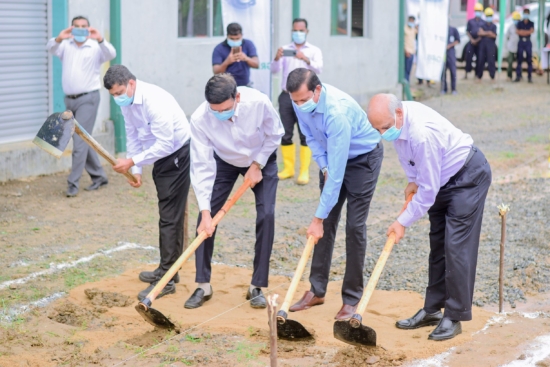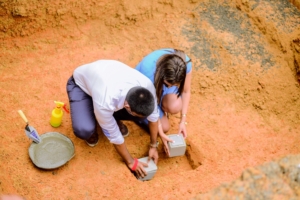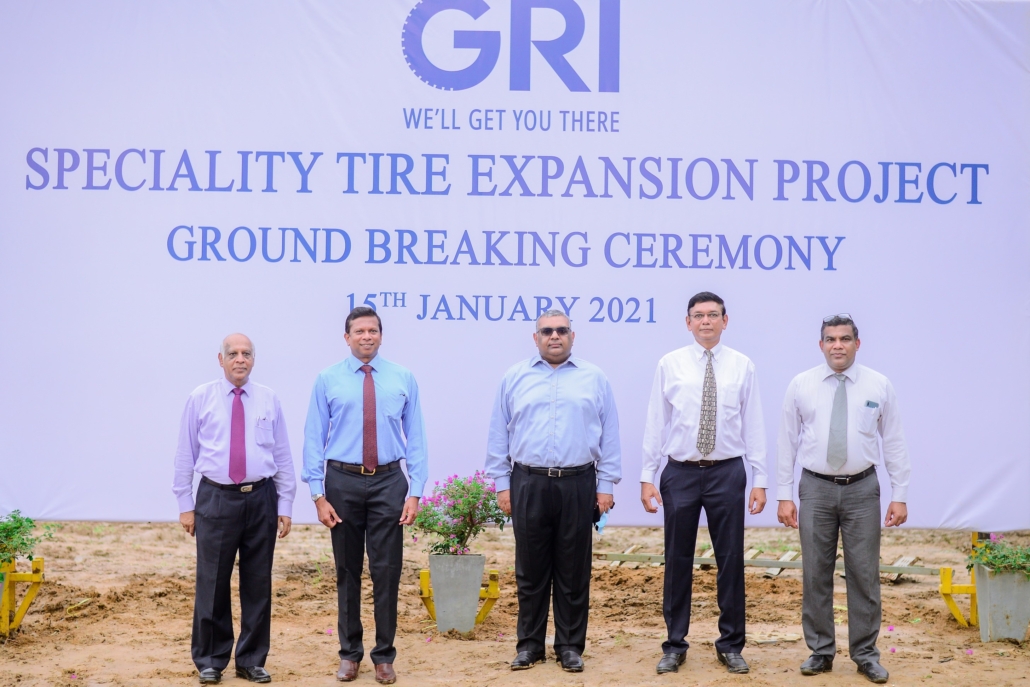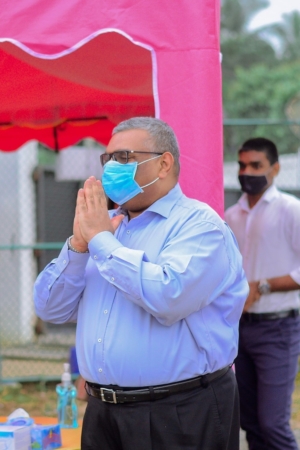GRI breaks ground on phase 2 of $100 million speciality tyre plant
 GRI CEO Dr Mahesha Ranasoma joins the company’s senior team in breaking ground (Photo: GRI)
GRI CEO Dr Mahesha Ranasoma joins the company’s senior team in breaking ground (Photo: GRI)
GRI’s youngest team members lay the foundation (Photo: GRI)
GRI has laid the foundation stone for the second phase of its $100 million manufacturing facility in Badalgama, Sri Lanka. The plant, in the Mirigama Export Processing Zone will expand production of speciality tyres as global demand for its products grows. The company has been expanding rapidly since its $40 million-plus investment in the “world-class” manufacturing facility, inaugurated in 2018. Phase two will include a new mixing facility, expanding the original plant by the end of 2021.
Managing director of GRI, Prabhash Subasinghe, explained that the new manufacturing facility is part of the company’s long-term vision and growth drive.
“GRI’s expansion and increase in our production capacity, in such a short time frame, is a result of the overwhelming demand for our GRI branded products in recent years. It has been rewarding to see how our products have been so well received in an extremely competitive market and lauded for its superlative quality, service and innovation – we are well-positioned to carve a niche for Sri Lankan specialty tyres in the world market.”
GRI held a closed, intimate ceremony in line with local Covid-19 regulations marking the start of phase two developments. Senior management broke ground and the youngest members laid the foundation stone for GRI’s new facility.
“The new manufacturing facility will be equipped with state-of-the-art machinery and is set to quadruple GRI’s current production capacity bringing it to 750,000 tyres per year and a total capacity of 100 tons per day. The new factory will focus on agriculture tyres with a large share dedicated for advanced radial agriculture tyres. Furthermore, GRI is the only manufacturer in Sri Lanka with radial agriculture manufacturing capability.
“We will also be doubling employment and will build the GRI team to 500 employees across areas such as production, engineering, quality assurance, advanced technology, research and development,” said Dr Mahesha Ranasoma, CEO of GRI.
“The new facility will add 11,600 square meters of production area that will take the main tyre plant to 22,400sqm (240,000sqft) which is equivalent to the size of three football fields. A key feature in the new production plant is that it will equip GRI with the capability to manufacture larger sized agricultural tyres. Our maximum tyre size now is 50 inches. We will soon be able to manufacture tyres up to 60 inches in size in the new production plant to meet growing market demand and cater to our customer requirements,” commented Ananda Caldera, executive director of GRI. “Further, the company will add 22 tyre building machines and 36 presses to its current capacity.”
GRI’s senior management team conducts the groundbreaking ceremony in Badalgama, Sri Lanka (Photo: GRI)
Sustainability focus
GRI managing director, Prabhash Subasinghe (Photo: GRI)
In addition to boosting its capacity and technical capabilities, GRI’s focus on sustainability as a part of all its operations is further reiterated through its new production facility.
The new plant will expand GRI’s solar panel initiative and generate 2.5 megawatts of solar power. The factory will continue to use biomass boilers instead of furnace oil boilers while production at the facility will continue with an environmentally friendly ‘dry’ process, with no emission of gases or liquid disposal, and ensuring low material wastage. The new production facility will also extend GRI’s green policies on waste management through rainwater harvesting and an efficient wastewater management system. GRI will also conduct a carbon footprint analysis and work to offset any environmental impact.
GRI was founded in 2002 and is working towards a vision of taking high-grade Sri Lankan speciality tyres to the world. The company produces radial agriculture tyres, construction tyres and material handling solid tyres through locally produced natural rubber. It has a business presence in more than 50 countries.





Comments